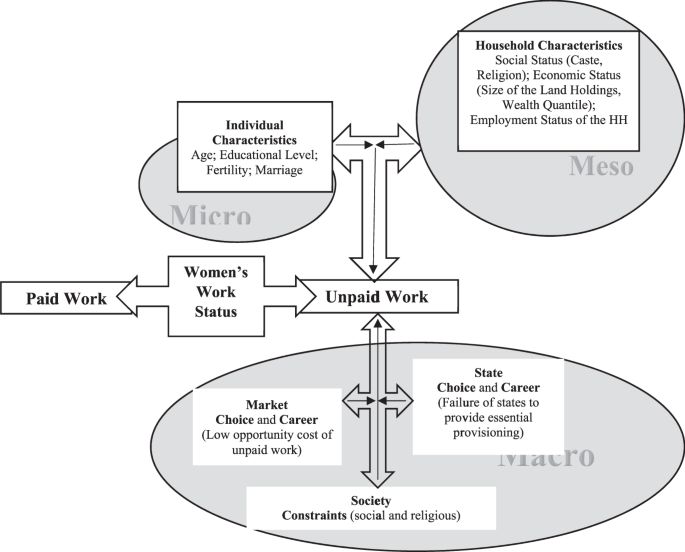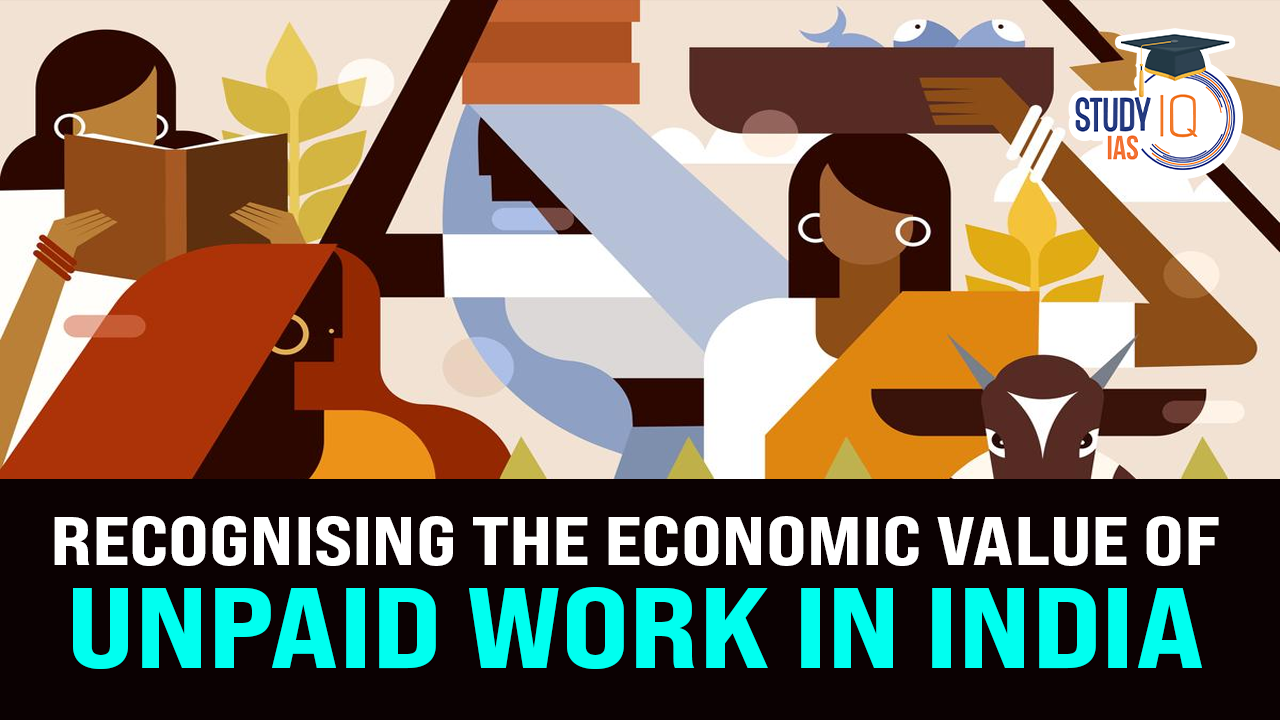Table of Contents
What is meant by Unpaid Work?
- It refers to activities that individuals perform without receiving financial compensation, despite these activities having economic value.
- This type of work primarily includes:
- Domestic Tasks: Cooking, cleaning, laundry, and other household chores.
- Caregiving: Looking after children, elderly family members, or individuals with disabilities.
- Emotional and Social Support: Providing emotional care, managing family relationships, and coordinating household schedules.
- These activities are considered work because theoretically one could pay a third person to perform them.
Why are women often engaged in unpaid domestic work?
- Because of 3 factors:
- constraints (social and religious)
- choices (failure of the market and states to provide essential provisioning)
- career (low opportunity cost of unpaid work in the market).

Wages for Housework: History
- Origins of the Campaign: The International Wages for Housework Campaign was launched in Italy in 1972, quickly gaining traction in the UK and US.
- Challenges in Implementation: Despite initial enthusiasm, wages for housework faced criticism for potentially reinforcing traditional gender roles and practical difficulties, such as determining payment sources and standardising compensation.
- India’s Attempts: In 2010, the National Housewives Association in India sought recognition as a trade union, but the application was denied as housework wasn’t classified as a trade.
- In 2012, a proposal to mandate salaries for housework was discussed but never implemented.
- Cash Transfer Schemes: States like Goa and Assam have introduced schemes like Griha Aadhar and Orunodoi, which provide financial assistance to women. However, these are framed as support measures rather than direct payments for household work.
- Judicial Recognition: In a landmark case, the Indian Supreme Court ruled in a motor accident claim case that household work is no mean feat and fixing notional income for a non-earning “homemaker… is a step towards the constitutional vision of social equality and ensuring the dignity of life to all individuals”.
Unpaid Work Impacts
- Lower Workforce Participation for Women: The heavy burden of unpaid domestic responsibilities often restricts women from joining the paid workforce.
- Example: The current labour force participation rate (LFPR) of women is 41.7%.
- Loss of Productive Potential: Women spend about 36 hours weekly on unpaid work, compared to men’s 16 hours. This reduces the time they could otherwise dedicate to paid work.
- Invisible Economic Contribution: Unpaid labour is often seen as a traditional duty rather than a productive economic activity.
- According to a 2023 State Bank of India report, unpaid work in India adds around ₹22.7 lakh crore, or 5% of GDP.
- Research indicates that women’s unpaid labour could boost GDP by 27% if adequately recognized.
Barriers and Social Implications
- Complex Implementation: Practical questions arise, such as who would provide the wages, in what form, and how much.
- Socially, some concerns paying for housework might reinforce patriarchal and caste-based inequalities.
- Political Relevance: Although the issue garners attention during election cycles, experts argue that simply providing wages doesn’t address the deeper social inequities at play.
The Way Forward: Reducing Gender Inequality in Unpaid Work
- Recognition through Data: Collecting time-use data is essential to highlight the scale of unpaid work.
- The ‘NSS Report – Time Use in India 2019’ marked India’s first national survey in this area, helping make unpaid care work more visible.
- Investing in Infrastructure: Reducing unpaid work can be achieved by improving infrastructure. For instance, access to clean water, sanitation, and cooking gas reduces household labour.
- Oxfam reports that access to the National Rural Drinking Water Programme (NRDWP) saved women an average of 22 minutes per day on unpaid work, while LPG under the Pradhan Mantri Ujjwala Yojana saved them 49 minutes daily.
- Redistributing Care Work: Sharing care responsibilities between genders and with the state could help reduce the burden on women.
- Policies that expand childcare and early childhood education can create jobs and support women in the workforce.
- This would also help reduce the ‘motherhood penalty,’ which disproportionately impacts working mothers.


 5 Years of SVAMITVA Scheme and Its Benef...
5 Years of SVAMITVA Scheme and Its Benef...
 Places in News for UPSC 2025 for Prelims...
Places in News for UPSC 2025 for Prelims...
 Countercyclical Capital Buffer (CCyB): P...
Countercyclical Capital Buffer (CCyB): P...





















